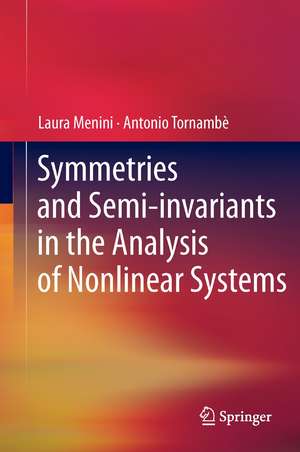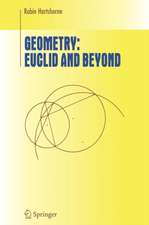Symmetries and Semi-invariants in the Analysis of Nonlinear Systems
Autor Laura Menini, Antonio Tornambèen Limba Engleză Paperback – 23 aug 2014
The theory is developed for general nonlinear systems and specialized for the class of Hamiltonian systems. By using the strong geometric structure of Hamiltonian systems, the results proposed are stated in a different, less complex and more easily comprehensible manner. They are applied to physically motivated systems, to demonstrate how much insight into known properties is gained using these techniques. Various control systems applications of the techniques are characterized including: computation of the flow of nonlinear systems; computation of semi-invariants; computation of Lyapunov functions for stability analysis and observer design.
| Toate formatele și edițiile | Preț | Express |
|---|---|---|
| Paperback (1) | 643.16 lei 6-8 săpt. | |
| SPRINGER LONDON – 23 aug 2014 | 643.16 lei 6-8 săpt. | |
| Hardback (1) | 648.24 lei 6-8 săpt. | |
| SPRINGER LONDON – 8 mai 2011 | 648.24 lei 6-8 săpt. |
Preț: 643.16 lei
Preț vechi: 756.65 lei
-15% Nou
Puncte Express: 965
Preț estimativ în valută:
123.07€ • 131.60$ • 102.61£
123.07€ • 131.60$ • 102.61£
Carte tipărită la comandă
Livrare economică 18 aprilie-02 mai
Preluare comenzi: 021 569.72.76
Specificații
ISBN-13: 9781447162414
ISBN-10: 1447162412
Pagini: 352
Ilustrații: IX, 340 p.
Dimensiuni: 155 x 235 x 18 mm
Greutate: 0.49 kg
Ediția:2011
Editura: SPRINGER LONDON
Colecția Springer
Locul publicării:London, United Kingdom
ISBN-10: 1447162412
Pagini: 352
Ilustrații: IX, 340 p.
Dimensiuni: 155 x 235 x 18 mm
Greutate: 0.49 kg
Ediția:2011
Editura: SPRINGER LONDON
Colecția Springer
Locul publicării:London, United Kingdom
Public țintă
ResearchCuprins
Part I: Theory.- Introduction.- Notation and Background.- Analysis of Linear Systems.- Analysis of Nonlinear Systems.- Analysis of Hamiltonian Systems.- Linearization by State Immersion.- Linearization by State Immersion of Hamiltonian Systems.- Extensions Based on the Use of Orbital Symmetries.- Part II: Applications to Control Systems.- Computation of the Flow of Linearizable Systems.- Semi-invariants.- Stability Analysis.- Observer Design.- Exact Sampling of Continuous-time Systems.- Applications to Physically Motivated Systems.
Recenzii
From the reviews:
“The book Symmetries and semi-invariants in the analysis of nonlinear systems deals with some useful techniques to analyze the qualitative behavior of both continuous and discrete finite-dimensional dynamical systems. … It is written very clearly, is basically self-contained, and a large number of exercises and examples are included. In summary, the book is highly recommended for all who work in dynamical systems, especially when the concept of symmetry plays an essential role.” (Isaac A. García, Mathematical Reviews, January, 2014)
“The book Symmetries and semi-invariants in the analysis of nonlinear systems deals with some useful techniques to analyze the qualitative behavior of both continuous and discrete finite-dimensional dynamical systems. … It is written very clearly, is basically self-contained, and a large number of exercises and examples are included. In summary, the book is highly recommended for all who work in dynamical systems, especially when the concept of symmetry plays an essential role.” (Isaac A. García, Mathematical Reviews, January, 2014)
Notă biografică
Antonio Tornambè is a professor and Laura Menini is an associate professor, both in the area "Automatica", which covers both control Theory and robotics. Both of them have been involved in research in those fields generally and, of particular relevance to this book, they have worked on observer design for nonlinear systems (possibly subject to impulsive effects), on stabilization and tracking by state feedback for nonlinear systems, on modeling and control of mechanical systems (possibly subject to impacts), and on control of Hamiltonian systems. They also have wide experience of teaching and their main motivation for writing this book is that of collecting some recent results on the analysis of nonlinear systems, most of them hitherto unpublished, in the mathematical framework that allows both their rigorous derivation and a deep understanding of their meaning and their applicability.
Textul de pe ultima copertă
Symmetries and Semi-invariants in the Analysis of Nonlinear Systems details the analysis of continuous- and discrete-time dynamical systems described by differential and difference equations respectively. Differential geometry provides the essential tools for the analysis, tools such as first-integrals or orbital symmetries, together with normal forms of vector fields and of maps. The use of such tools allows the solution of some important problems, studied in detail in the text, which include linearization by state immersion and the computation of nonlinear superposition formulae for nonlinear systems described by solvable Lie algebras.
The theory is developed for general nonlinear systems and, in view of their importance for modeling physical systems, specialized for the class of Hamiltonian systems. By using the strong geometric structure of Hamiltonian systems, the results proposed are stated in a quite different, less complex and more easily comprehensible manner. Throughout the text the results are illustrated by many examples, some of them being physically motivated systems, so that the reader can appreciate how much insight is gained by means of these techniques. Various control systems applications of the techniques are characterized including:
· computation of the flow of nonlinear systems;
· computation of semi-invariants;
· computation of Lyapunov functions for stability analysis.
Symmetries and Semi-invariants in the Analysis of Nonlinear Systems will be of interest to researchers and graduate students studying control theory, particularly with respect to nonlinear systems. All the necessary background and mathematical derivations are related in detail but in a simple writing style that makes the book accessible in depth to readers having a standard knowledge of real analysis, linear algebra and systems theory.
The theory is developed for general nonlinear systems and, in view of their importance for modeling physical systems, specialized for the class of Hamiltonian systems. By using the strong geometric structure of Hamiltonian systems, the results proposed are stated in a quite different, less complex and more easily comprehensible manner. Throughout the text the results are illustrated by many examples, some of them being physically motivated systems, so that the reader can appreciate how much insight is gained by means of these techniques. Various control systems applications of the techniques are characterized including:
· computation of the flow of nonlinear systems;
· computation of semi-invariants;
· computation of Lyapunov functions for stability analysis.
Symmetries and Semi-invariants in the Analysis of Nonlinear Systems will be of interest to researchers and graduate students studying control theory, particularly with respect to nonlinear systems. All the necessary background and mathematical derivations are related in detail but in a simple writing style that makes the book accessible in depth to readers having a standard knowledge of real analysis, linear algebra and systems theory.
Caracteristici
Most results are derived for continuous- and discrete-time systems showing readers how to recognises when their own techniques are valid in both cases Rigorous mathematical treatment in a simple style allows in-depth understanding to be easily acquired Self-contained presentation requires only the most basic of mathematical knowledge of real analysis, linear algebra and systems theory Includes supplementary material: sn.pub/extras















